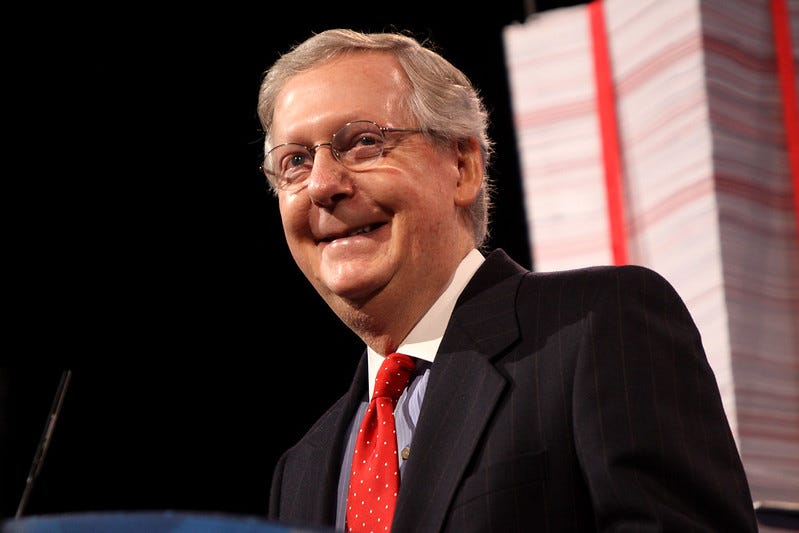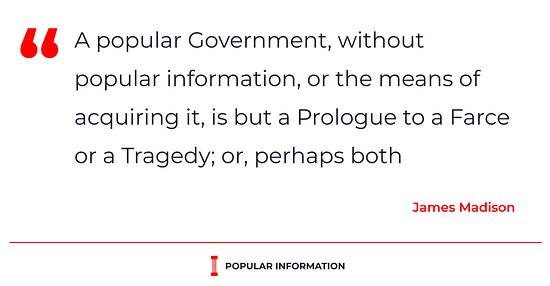 |
When Congress passed legislation mandating paid sick leave during the pandemic, it exempted 80% of American workers. Notably, the requirement does not apply to any business with more than 500 employees. That means, with the lockdown still in place across much of the country, many "essential workers" have to choose between coming to work sick and receiving a paycheck.
Public scrutiny has prompted several large companies to improve their policies voluntarily, but many workers continue to expose themselves to substantial risk without basic protections. Health care workers, meat packers, grocery store clerks, and warehouse employees are getting sick and dying.
Nevertheless, several states, despite warnings from public health officials, have begun loosening restrictions on businesses and bringing more people back to work. Simon Property Group, the largest mall operator in the United States, plans to reopen 49 malls in Alaska, Arkansaw, Georgia, Mississippi, Oklahoma, South Carolina, Tennessee, Texas, Indiana, and Missouri between May 1 and May 4. Right now, this activity is concentrated in states with Republican governors. But all states are expected to loosen restrictions at some point before a vaccine is available, exposing workers in contact with the public to health risks.
Workers returning to the job for the foreseeable future need protective equipment, operational plans that prioritize employee health over short-term profits, and paid sick leave. These are the minimum requirements to protect workers and customers.
Is the Republican-controlled Senate doing anything to improve conditions for workers as they return to their jobs? No. Instead, the Senate is preparing legislation to shield companies from liability if its workers get sick or die.
Majority Leader Mitch McConnell (R-KY) said that giving businesses immunity from litigation is his top priority as part of the next stimulus package:
In an interview Monday on Fox News Radio, McConnell added that a liability shield for businesses and health care workers will be his "red line" in the next round of negotiations because "trial lawyers are sharpening their pencils to come after health care providers and businesses, arguing that somehow the decision they made with regard to reopening adversely affected the health of someone else."
McConnell indicated he would oppose critical funding for state and local governments unless the package also includes a liability shield.
Trump said Congress needs to "take liability away from these companies" because he wants "the companies to open and to open strong." But this isn't about carving out narrow protections for companies that play critical roles in responding to the pandemic and need to act quickly. The administration "already has granted more limited liability exemptions for companies involved in producing and distributing key medical supplies."
McConnell and Trump are echoing the call of U.S. Chamber of Commerce president Tom Donohue, who said it was "just not fair" for businesses to be liable for exposing workers to conditions that result in illness or death.
How a liability shield works
Under normal circumstances, if your health is compromised due to "your employer’s negligence, recklessness, or willful disregard for a safe work environment," a worker could sue to "recover damages for lost wages, medical expenses, and your pain and suffering." (In some states, workers can continue to be paid and get their medical bills reimbursed without proving negligence under a streamlined "workers' compensation" process.)
With a liability shield, workers will still lose wages, incur medical expenses, and experience pain and suffering, if they become sick at work. The difference is that all those costs would all be borne by workers and not employers.
Creating a liability shield, however, reduces the incentive for employers to "avoid tort liability by taking appropriate precautions." Justin Wolfers, a professor at the University of Michigan, explains this concept:
We want businesses to be scared. The claim from the Chamber of Commerce that liability will make people scared to do business is correct and that’s the point. We want businesses to take responsibility. All of tort law is about creating a strong incentive for people and companies to not act badly...What’s crystal clear is that if you let employers off the hook, they won’t take safety precautions.
This is an issue that will impact everyone, whether or not they immediately return to their workplace. "To protect public health, you have to protect worker health. And if they don't do that, it will spread into the community, and we'll have a second wave," Debbie Berkowitz, who worked at OSHA during the Obama administration, explained.
The risk of legal liability for corporations is already minimal because, even in a workers' compensation case, an employee needs to prove that they contracted the coronavirus at work. Since it's very difficult to prove where you contracted a virus, especially when there is community transmission, these lawsuits would be very difficult to win. But a liability shield means that corporations wouldn't even have to defend themselves.
In Illinois and California, workers' compensation insurers are not requiring essential workers to prove they contracted the coronavirus on the job, making it easier for them to be compensated. But in Illinois, two business groups are already challenging this change.
Not all businesses
While the U.S. Chamber of Commerce is the most powerful business lobby in America, it doesn't represent the views of every company. The Washington Post reports that "small businesses have told White House advisers that the liability waiver is not a top priority for them and that they want the administration to instead focus on expanding the small-business loan program crucial to their survival."
A different approach
While McConnell and Trump push for a liability shield, Senators Tammy Baldwin (D-WI) and Tammy Duckworth (D-IL) are taking a different approach. Baldwin and Duckworth introduced the "Every Worker Protection Act of 2020" last week. Instead of focusing on protecting employers from legal liability after employees get sick, the legislation tries to put in place protections to keep them from getting sick in the first place.
The legislation would "require the Occupational Safety and Health Administration (OSHA) to issue an Emergency Temporary Standard (ETS) within 7 days to protect health care and other employees from exposure to the coronavirus that causes COVID-19."
Currently, OSHA is producing optional guidance that companies are free to ignore. "In the face of this epidemic, OSHA could easily just put out a statement — a requirement saying all employers must follow [federal] OSHA regulations and CDC guidelines. But the decision has been made, right now at least, not to put that out," Dr. David Michaels, the former head of OSHA said. Instead, the Trump administration has placed "responsibility for worker protection in the hands of state governments." But "only 21 states have their own workplace safety programs or regulations in place."
The legislation would also "protect[] workers from retaliation for reporting infection control problems to their employer, any public authority, to the media or on a social media platform."
Photo Credit: Gage Skidmore
There are no advertisers or wealthy donors behind Popular Information. This publication exists because of readers like you. Support independent accountability journalism with a paid subscription.
Thanks for reading!


